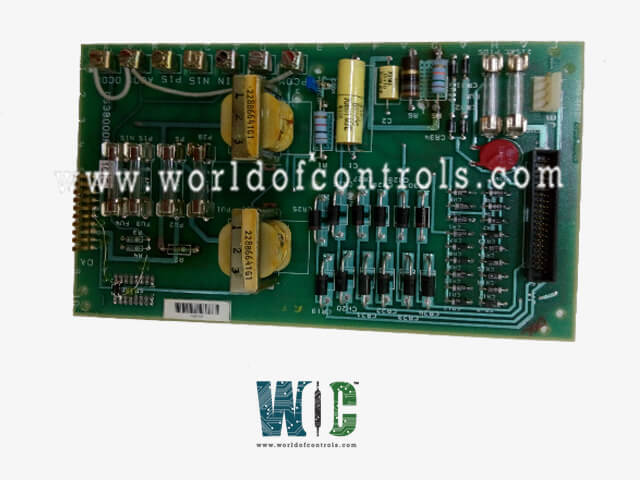SPECIFICATIONS
Part Number: DS3800DPSS
Manufacturer: General Electric
Series: Mark IV
Product type: Power Supply Card
Availability: In Stock
Country of Manufacture: United States (USA)
Functional Description
DS3800DPSS is a Power Supply Card designed and developed by GE. It is a part of Mark IV control system. These power supply cards are crucial components that provide power to other devices and modules within the control system, ensuring their proper operation.
Product Features
- The component has six protective fuses. These fuses safeguard the integrity of multiple circuits within the board. In the event of an overvoltage condition, the fuses play a pivotal role in preventing damage to the board or the potential flow of excessive current into other boards or components within the drive.
- Each of the six fuses on the board is uniquely identified with printed IDs, making it easy to pinpoint their locations and functions. The IDs, which include FU1, FU2, FU3, FU4, FU5, and FU6, are prominently displayed on the board. This clear identification simplifies the replacement process when necessary.
- When replacing a fuse, use one hand to gently remove one end of the fuse from the connector on the board. Similarly, remove the other end of the fuse from its connector. This ensures safe handling and prevents any electrical mishaps during the process.
System Testing
- The testing of Mark IV hardware production is a meticulous and structured process. It is divided into four distinct phases, namely components, cards, modules, and panels. This rigorous testing regimen ensures the quality, reliability, and performance of the hardware, contributing to its successful operation in industrial environments.
- The first phase involves subjecting all integrated circuits (ICs) to a temperature cycle. This procedure assesses how well the components can withstand varying temperatures, which is essential in industrial applications with fluctuating operating conditions.
- In the second stage, both fine and gross hermetic seal leakages are checked. Hermetic sealing is crucial, as it prevents the ingress of contaminants and ensures the integrity of the components. Fine and gross leakage testing identifies any potential issues in this regard.
- Following the seal inspections, the ICs undergo a burn-in process. This involves running the components at elevated temperatures for an extended period with electrical power applied. Burn-in helps identify early failures in the components and ensures their reliability under prolonged operation.
- Once the ICs have completed the three stages of screening, they undergo a 100 percent electrical parameter test. This test assesses the electrical characteristics of each component, ensuring that they meet the required specifications.
- Printed wire boards are exposed to a temperature of 155oF for 160 hours with electrical power turned on. This endurance testing helps identify any latent defects in the cards, ensuring their robustness in operational conditions.
- After the burn-in phase, cards are subjected to an in-circuit test. This testing method checks the functionality of various circuit components, connections, and electrical paths on the card. Any issues are detected and addressed during this phase.
- Functional testing evaluates the performance of the card. It ensures that the card operates as intended within the Mark IV hardware system.
- Modules and panels may require special calibration based on their unique functions. This calibration is performed separately after the initial testing phases to fine-tune their performance.
- Similar to the card testing phase, modules and panels are also subjected to in-circuit and functional testing. This process verifies their performance within the broader system.
- The in-circuit and functional testing phases benefit from the use of a specialized testing tool, the General Radio GR2270 tester. These tests are fully programmed, ensuring a high degree of consistency and accuracy. The use of such a tester is essential in providing reliable and repeatable results, meeting stringent quality standards.
WOC is happy to assist you with any of your GE requirements. Please contact us by phone or email for pricing and availability on any parts and repairs.
FREQUENTLY ASKED QUESTIONS
What is DS3800DPSS?
It is a Power Supply Card designed and developed by GE.
What is the purpose of the four distinct testing phases in Mark IV hardware production?
The four testing phases, which include components, cards, modules, and panels, aim to ensure the quality, reliability, and performance of the hardware for successful operation in industrial environments.
Why is subjecting integrated circuits to a temperature cycle in the first phase crucial?
Subjecting ICs to a temperature cycle assesses their ability to withstand varying temperatures, which is vital in industrial applications with fluctuating operating conditions.
What is the significance of fine and gross hermetic seal leakage checks in the second stage of testing?
Hermetic sealing is essential for preventing the ingress of contaminants and ensuring component integrity. Fine and gross leakage checks identify any potential issues in this regard.
